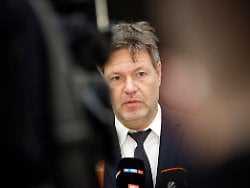Saturday, January 01, 2022
“Green” nuclear energy plans
Habeck is subject to EU greenwashing
Nuclear power plants produce highly hazardous waste and can cause devastating environmental disasters. The EU Commission nevertheless considers nuclear power to be a “green” technology of the future in certain cases. Vice Chancellor Habeck and Federal Environment Minister Lemke oppose this plan.
Federal Minister of Economics Robert Habeck is against the EU Commission’s plan to classify investments in gas and nuclear power plants as climate-friendly under certain conditions. “The EU Commission’s proposals dilute the good label for sustainability,” said Habeck in Berlin. “From our point of view, this amendment to the taxonomy rules would not have been necessary. We do not see any approval of the new proposals of the EU Commission,” said the Minister for Economic Affairs and Climate Protection.
The Brussels initiative stipulates that investments in new nuclear power plants can be classified as green or sustainable if the systems meet the latest technical standards. In addition, the operators must present a plan on how they want to dispose of the highly radioactive waste by 2050 at the latest.
The EU Commission’s plans are based on a draft legal act that became public on New Year’s Day shortly after it was sent to the EU member states.
“That is more than questionable”
“Labeling nuclear energy of all things as sustainable is wrong with this high-risk technology”, criticized Habeck, who is also Germany’s new climate protection minister, of the draft. This obscures the view of the long-term effects of nuclear waste on people and the environment. Hard security criteria are also not provided.
The taxonomy is a kind of set of rules that defines which projects and companies in the EU are considered “green” or “sustainable” and can be funded. According to the EU Commission, it wants to push ahead with the conversion to a climate-neutral financial system and a sustainable economy. Disclosure requirements for companies and financial market participants should also enable investors, among other things, to determine which projects and investments are “green”.
“That is more than worrying,” said the Green politician. “In any case, it is questionable whether this greenwashing will even find acceptance on the financial market.” The federal government will evaluate the possible effects of the commission’s draft.
Similar to Habeck, his party colleague and new Federal Environment Minister Steffi Lemke made a statement. “I think it is absolutely wrong that the European Commission intends to include nuclear power in the EU taxonomy for sustainable economic activities,” she told the newspapers of the Funke media group. “A form of energy that on the one hand can lead to devastating environmental disasters – in the event of serious reactor accidents – and on the other hand leaves behind large amounts of dangerous, highly radioactive waste cannot be sustainable.”
The federal government at the time had sealed the phase-out of nuclear energy in 2011 after the nuclear disaster in Fukushima, Japan. Recently, however, more supporters of nuclear energy have expressed themselves again because, unlike electricity production from coal, for example, it creates significantly less climate-damaging carbon dioxide. However, experts see continued operation or new technologies such as small SMR reactors as critical due to a lack of concepts and high construction costs.
“Sustainable” natural gas
Habeck also criticized the EU Commission for wanting to include natural gas in the taxonomy. “At least the EU Commission is making it very clear here that gas from fossil fuels is only a transition and that it has to be replaced by green hydrogen,” he explained. New gas-fired power plants would have to be geared towards hydrogen now and would be operated with green hydrogen or low-carbon gas from 2035. “That is ambitious and requires large amounts of hydrogen.” It is one of the major tasks to encourage appropriate investments in hydrogen. The first corresponding projects are on the track in Germany.
The Brussels plan provides that new natural gas power plants can receive the sustainability label as a “transition technology” if they comply with certain CO2 limits, replace a more polluting plant and are approved by December 31, 2030.
DUH criticizes Scholz
Deutsche Umwelthilfe (DUH) criticized the EU Commission’s intentions most clearly. This would “enable environmentally harmful investments under a green guise,” warns the organization. The EU member states and the European Parliament would have to take a clear position against this project.
The DUH attacked Chancellor Olaf Scholz because of the draft. He apparently “advocated the inclusion of fossil gas in the taxonomy and in return supported the French desire to include dangerous nuclear power”.
Scholz risked “the reputation of the federal government in terms of climate policy,” said DUH federal manager Sascha Müller-Kraenner. The EU Commission, in turn, is undermining “its own climate targets and the Green Deal as a whole” with the draft. So far, no comment has been received from EU Commission President Ursula von der Leyen. She wants to publish the new set of rules in the course of January.
